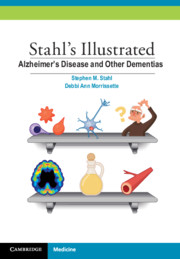Book contents
- Frontmatter
- Dedication
- Preface
- Contents
- CME Information
- Objectives
- Introduction
- Chapter 1 Alzheimer’s Disease
- Chapter 2 Lewy Body Dementias and Other Synucleinopathies
- Chapter 3 Frontotemporal Lobar Degeneration and Tauopathies
- Chapter 4 Other Dementias
- Chapter 5 Treatment of Secondary Behavioral Symptoms of Dementia
- Summary
- References
- Index
- Optional Posttest and CME Certificate
CME Information
Published online by Cambridge University Press: 19 October 2021
- Frontmatter
- Dedication
- Preface
- Contents
- CME Information
- Objectives
- Introduction
- Chapter 1 Alzheimer’s Disease
- Chapter 2 Lewy Body Dementias and Other Synucleinopathies
- Chapter 3 Frontotemporal Lobar Degeneration and Tauopathies
- Chapter 4 Other Dementias
- Chapter 5 Treatment of Secondary Behavioral Symptoms of Dementia
- Summary
- References
- Index
- Optional Posttest and CME Certificate
Summary
Overview
The term “dementia” describes a collection of symptoms including cognitive dysfunction, memory loss, language and communication issues, and behavioral symptoms such as agitation. There are numerous causes of dementia ranging from neurodegenerative disorders to excessive alcohol use, and worldwide over 35 million individuals have some form of dementia. Alzheimer's disease is by far the most common cause of dementia, followed by vascular dementia and Lewy body dementia; however, many individuals present with pathological characteristics of more than one dementia (i.e., “mixed” dementia). Although dementia risk increases significantly with age, dementia is not necessarily an inevitable consequence of getting older. Furthermore, while many forms of dementia are irreversible (including Alzheimer's disease, frontotemporal lobar degeneration, and dementia with Lewy bodies), approximately 9% of individuals with dementia have potentially reversible conditions (e.g., vitamin deficiency, depression).
In this book, we will describe the most common causes of dementia, review best practices for differentially diagnosing dementia, as well as management strategies to help improve quality of life for both patients with dementia and the individuals who care for them.
Learning Objectives
After completing this activity, you should be better able to:
• Identify the neurobiological and molecular bases of Alzheimer's disease and other dementias
• Apply differential diagnostic assessment of patients with dementia according to established best practices
• Recognize the utility of currently available treatments for dementia
• Explore the state of research on novel compounds in development for the treatment of dementia
Accreditation and Credit Designation Statements
The Neuroscience Education Institute (NEI) is accredited by the Accreditation Council for Continuing Medical Education (ACCME) to provide continuing medical education for physicians.
NEI designates this enduring material for a maximum of 8.0 AMA PRA Category 1 Credits™. Physicians should claim only the credit commensurate with the extent of their participation in the activity.
The American Society for the Advancement of Pharmacotherapy (ASAP), Division 55 of the American Psychological Association, is approved by the American Psychological Association to sponsor continuing education for psychologists. ASAP maintains responsibility for this program and its content.
The American Society for the Advancement of Pharmacotherapy designates this program for 8.0 CE credits for psychologists.
- Type
- Chapter
- Information
- Publisher: Cambridge University PressPrint publication year: 2018

